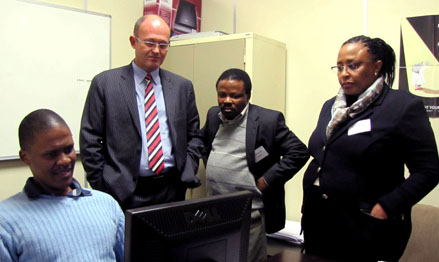|

|
|
David Nkwenkweza, an employee of the Unit for Students with Disabilities at the UFS, with from the left: Gerhard Joubert, Head: Group Marketing and Stakeholder Relations at PPS Insurance; Tsholo Diale, Corporate Social Investment Manager at Afrisam, and Mpho Letlapo CEO of the Sasol Inzalo Fund
Photo: Phelekwa Mpono
|
Business leaders from some of South Africa’s top companies visited our Bloemfontein Campus on Tuesday, 16 August 2011. Business leaders, which included chief executive officers (CEOs) and top managers from companies, such as Intel, First National Bank and Mediclinic flew in from Johannesburg. They were taken on a trip around campus, meeting university staff and students.
The purpose of the visit was to introduce them to the UFS and some of its projects. It was furthermore to share ideas about what role the university need to play in preparing future leaders for the market place.
Walking around campus, the group of business leaders visited the different faculties, some departments, as well as the bustling Thakaneng Student Centre.
Ms Mpho Lethlapo, CEO of the Sasol Inzalo Fund, said the UFS campus was different from what she had envisioned. She was impressed with our Unit for Students with Disabilities and said the outstanding facilities at the unit were a necessity as people with disabilities form part of society.
Mr Pule Mokoena, Group Executive: Sales and Marketing of Innovation said his trip to the university was an eye-opener as he had certain perceptions about the university. He expressed admiration towards Prof. Jonathan Jansen, Vice-Chancellor and Rector, and said his outlook towards learning was commendable. Mr Mokoena furthermore said the people on the UFS campus were more open-minded than what he had expected and said everywhere he went staff said they only wanted what was best for their students. According to Mr Mokoena, Kovsie students are the type of graduates business leaders want to employ.